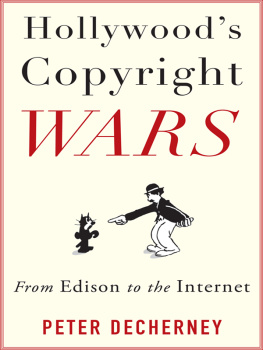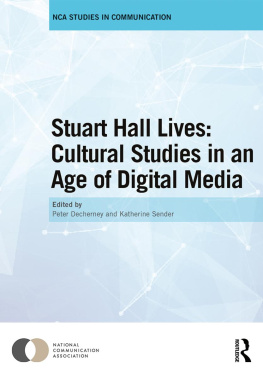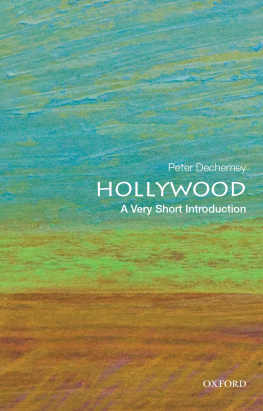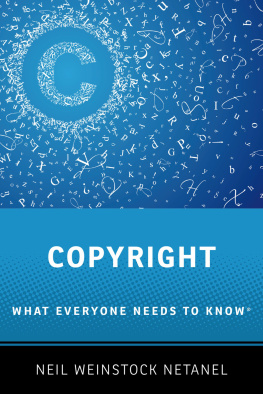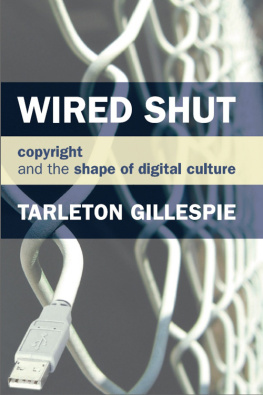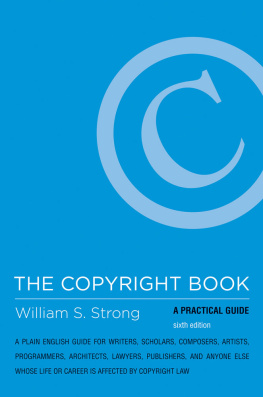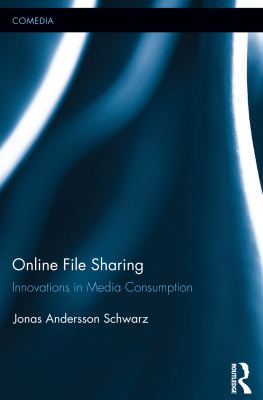HOLLYWOODS COPYRIGHT WARS
FILM AND CULTURE John Belton, Editor
Peter Decherney
HOLLYWOODs
COPYRIGHT WARS
FROM EDISON TO THE INTERNET

COLUMBIA UNIVERSITY PRESS
NEW YORK

COLUMBIA UNIVERSITY PRESS
Publishers Since 1893
New York Chichester, West Sussex
cup.columbia.edu
Copyright 2012 Peter Decherney
All rights reserved
E-ISBN 978-0-231-50146-0
Library of Congress Cataloging-in-Publication Data Decherney, Peter.
Hollywoods copyright wars: from Edison to the internet / Peter Decherney.
p. cm.(Film and culture)
Includes bibliographical references and index.
ISBN 978-0-231-15946-3 (cloth: alk. paper)
1. CopyrightMotion picturesUnited StatesHistory. 2. CopyrightBroadcasting rightsUnited StatesHistory. I. Title. KF3070.D43 2012
346.730482dc23
2011041745
A Columbia University Press E-book.
CUP would be pleased to hear about your reading experience with this e-book at .
References to Internet Web sites (URLs) were accurate at the time of writing. Neither the author nor Columbia University Press is responsible for URLs that may have expired or changed since the manuscript was prepared.
for Emily

CONTENTS
| Edisons Kinetographic Record of a Sneeze, aka Fred Otts Sneeze (1894), the first film registered for copyright |
| Napolean Saronys photograph of Oscar Wilde, the subject of an 1884 Supreme Court case |
| The Mother Elephant Hebe and her Baby Americus, the subject of an 1888 Supreme Court case |
| Siegmund Lubin, king of the film pirates |
| Advertising Lubins short-lived court victory over Edison |
| One of the posters considered in Bleistein v. Donaldson (1903) |
| Members of the Motion Picture Patents Company (c. 19081909) 36 |
| The Black Maria, Edisons studio |
| Eugen Sandow the strong man, posing for Edison in the Black Maria (1894) |
| Loie Fuller performing the Serpentine Dance |
| The Harper Brothers |
| Loie Fullers dress frame patent |
| How a French Nobelman Got a Wife Through the New York Herald Personal Columns (1904) |
| 203 Charlie Chaplins: A Chaplin lookalike contest |
| An advertisement for Chaplin imitator Billy West |
| Felix the Cat in Hollywood (1923): A parody of Chaplin |
| Charlie Chaplin in The Champion (1915) |
| Mexican actor and Chaplin imitator Charles Amador |
| Harold Lloyd in The Freshman (1925) |
| Adam Sandler in The Waterboy (1998) |
| The church scene from When Tomorrow Comes (1939) |
| Judge Learned Hand |
| The Cohens and Kelleys in Atlantic City (1929) |
| Joan Crawford in Letty Lynton (1932) |
| Billy Wilders Ace in the Hole (1951) |
| Poster for Gene Autrys Home on the Prairie (1939) |
| Shane (1953)mutilated by TV editing? |
| Death of a Gunfighter (1969), the first film to carry the Allen Smithee credit |
| Screen shot from TV series Battlestar Galactica (197879) |
| Screen shot from Star Wars (1977) |
| Screen shot from Monty Pythons Flying Circus |
| Its a Wonderful Life (1946): one of the early film classics to be colorized |
| Screen shot from Abraham Zapruders film of the Kennedy assassination |
| Screen shot from Bruce Conners assemblage film Report (19631967) |
| Screen shot from Kenneth Angers Scorpio Rising (1964) |
| Screen shot from Hardware Wars (1977), a Star Wars spoof |
| Early copy protection: the Chained Library of Hereford Cathedral in England |
| The placement of sprocket holes in a typical Edison film |
| Steve Jobs introduces the Macintosh computer (1984) |
| A member of the Free Culture student organization protesting copy protection on music and movies |
L IKE MANY BOOKS about copyright, I must start by thanking the inimitable copyright scholar Peter Jaszi. Peter has been my guide and guru throughout the research and writing of this book. He has generously spent many hours talking with me and reading drafts of every part of the manuscript. As others who know Peter will surely agree, he is like the eye of the copyright storm; things grow more confusing and tumultuous the farther away you get.
I also need to thank Peter Jaszis college friend and my longtime mentor John Belton. Through Columbia University Press, John has assembled one the best book series in the history of media studies. Johns secret, I have been privileged to learn, is not only selecting good books but tirelessly cultivating authors, sending relevant articles and thoughtful notes. Most importantly, he is always my toughest reader.
I was fortunate to write this book while many other scholars in a variety of fields were interested in similar questions. Writing the book has felt closer to a conversation than a monologue. Many people have offered invaluable comments on drafts or after hearing me present work in progress at conferences. In particular, I want to single out the incisive criticism of Patricia Aufderheide, Eric Hoyt, Paul Saint-Amour, Jessica Silby, Bob Spoo, Rebecca Tushnet, and Martha Woodmansee.
My colleagues at the University of Pennsylvania must feel like they have been listening to me talk about Hollywood and copyright forever. Yet they never cease to show up for more and to keep me on my toes. I greatly appreciate the friendship and intellectual support of Karen Beckman, Tim Corrigan, Michael X. Delli Carpini, Jim English, Nathan Enzmenger, Gerry Faulhaber, Nicola Gentili, Andrea Matwyshyn, Meta Mazaj, Sharrona Pearl, Monroe Price, Katherine Sender, Peter Stallybrass, Wendy Steiner, Joe Turow, Anu Vedantham, Kevin Werbach, Christopher Yoo, and Barbie Zelizer. And I hate to imagine what I would have missed without the research support of Tamar Lisbona and Gary Kafer.
Work on this book has been supported by a number of institutions, organizations, and publications. I received generous grants and fellowships from the Academy of Motion Picture Arts and Sciences, the American Council of Learned Societies, the Scholars Program in Culture and Communication at the Annenberg School for Communication, and the Penn Humanities Forum. The International Society for the History and Theory of Intellectual Property, the Penn History of Material Texts Seminar, the Wharton Media and Communications Colloquium, and the Annenberg Internet and Media Policy Working Group greatly enriched my work by allowing me to present in their intense and collegial forums. And Kings College, London, where most of the book was written, offered an essential escape from distraction, while being right in the heart of London. Earlier versions of chapters or parts of chapters have been published in the journal Film History, the University of Wisconsin Law Review, and in Paul Saint-Amour, ed., Modernism and Copyright (Oxford University Press, 2011). Thank you for permission to reprint material here. My editors at Columbia University Press have shown enthusiasm for the project since I first mentioned it. In the final stages, Jennifer Crewe put up with far too many questions about rights, and I was fortunate to have Roy Thomas cast his famous eye over the manuscript.
Next page
